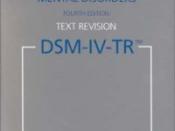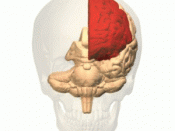Psychopaths
The term "psychopath" is used to describe a mental illness. In 1952, the American Psychiatric Association suggested using the term "sociopath" as a more acceptable alternative. The term sociopath is used to describe an individual who habitually violates known norms and laws. Sociopath is used to describe behavioral patterns, rather than a mental disease. The terms have been used interchangeably. In 1968, the American Psychiatric Association merged these two concepts together and labeled them as Antisocial Personality Disorder. This term refers to an individual that displays chronic and continuous antisocial behavior in which the rights of others are violated. By grouping a sociopath and a psychopath into a single disorder, it is less difficult to diagnose the disorder, with respect to the DSM manuals.
There are various characteristics that can lead to the diagnosis of Antisocial Personality Disorder. Dr. Robert Hare, a well respected Canadian researcher on the topic of psychopathic personality, devised a twenty two item checklist to determine the degree of the illness.
The Psychopath Checklist Revised or the PLC-R, provides a numerical measure of the degree of psychopath in an individual. The test measures the attitudes and the feelings of the individual and the socially deviant behavior of the individual. In general, a psychopath usually displays a variety of other characteristics. They are usually egocentric individuals, that show no real sense of responsibility or morality. A sociopath may be charming and display signs of an above normal intelligence level and excellent language fluency. They are impulsive manipulative people that are prone to aggression, hostility, and self destructive behaviors, such as alcohol or drug abuse. Psychopaths appear very normal and collected on the surface, but there is a lack of emotional intelligence on the interior. They show no remorse for their immortal behaviors. This may...


